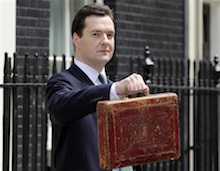
Thirty thousand public service jobs in the Six Counties are to be eliminated after the British government slashed its promised contribution to maintaining society in the Six Counties.
The funding, used to provide public services and middle class employment across the North of Ireland, is to be cut by 1.4 billion pounds next year alone.
The cuts are part of dramatic reductions in public spending by the British exchequer and were announced by the British Chancellor George Osborne in London on Wednesday.
Osborne’s decisions sparked a major political row in the North after First Minister Peter Robinson and Deputy First Minister Martin McGuinness accused him of “bad faith”.
Mr Robinson and Mr McGuinness said they were dismayed by the cuts, including a 36 per cent reduction in capital spending.
However, British Secretary of State Owen Paterson claimed the North had been given a “remarkable deal”, adding that both men were “pleasantly relieved” when he briefed them about the plan before the announcement.
Robinson and McGuinness accused Paterson of acting merely as a voice for the British Treasury.
Mr McGuinness said Mr Paterson was both a “shame” and a “disgrace”.
“Owen Paterson has been effectively on the side of the chancellor [George Osborne] and has been far from a champion for the North and all that does is damage our working relationship that we wanted to have with the Secretary of State,” he said. “We have not been fairly treated by the new Tory-led government or by Owen Paterson.”
Robinson added: “Owen should be speaking for Northern Ireland rather than the treasury on these matters.” He said that the 2006 St Andrews Agreement “guaranteed” the Stormont administration at least 18 billion pounds over 10 years.
He said: “We had a deal, that deal was guaranteed, it was guaranteed by the last administration and at no stage did the Conservatives indicate that they would not stand over that agreement...
“If we cannot bank that kind of decision, what kind of trust can we have in anything else guaranteed by the St Andrews Agreement?”
An estimated 15,000 people demonstrated in Belfast on Saturday against the cuts.
Union leaders, who organised the rally, condemned Mr Osborne’s actions, saying the treasury’s figures showed that the poorest 10 per cent in society will be the second-biggest losers.
Sinn Fein urged the North's political parties to unite to fight the cuts.
“We put it to our Executive colleagues that there needs to be consensus when fighting these cuts," said Regional Development Minister Conor Murphy.
"We were elected to do this and represent the citizens of the North, to deliver for them and not to acquiesce to what the British government has proposed. This would be failing our electorate gravely."
NO CONSENSUS
Meanwhile, an attempt to form a cross-party consensus on a four-year budget plan for the 26 Counties collapsed within hours of the start of talks in Dublin on Wednesday.
Both Fine Gael leader Enda Kenny and Labour leader Eamon Gilmore said the attempt at consensus had come to an end and there would be no further meetings between party leaders.
The 'consensus for cuts' had been widely seen as a charade following alarming revelations of the state's precarious financial position last week.
Mr Kenny – speaking outside the Dublin parliament – said Fianna Fáil had brought the country to the brink of losing its sovereign independence and only a new government would have credibility in dealing with the crisis.
He said Fine Gael would now bring forward an alternative four-year plan, in addition to a pre-budget submission.
Eamon Gilmore tersely declared the process was over. “There are clearly differences between the approach of the Labour Party and the Government in relation to budgetary strategy," he said.
“I think it is fair to say that the expectations that there was going to be some kind of consensus on the budget, that that is not going to happen.
“And to be fair I’m not sure it was ever actually intended to happen because the Taoiseach did confirm to us that it is the Government’s intention itself to bring forward its budget.”
Sinn Féin President Gerry Adams joined his parliamentary team outside Government Buildings to protest against their exclusion from the talks.
Sinn Féin is the only Dáil party to reject an EU-imposed deadline to bring the budget deficit to 3% within four years, a view that is gaining considerable support.
"I believe that the Government has known that this target is unachievable but pursued a political consensus around it in a fundamentally flawed attempt to create confidence in Ireland among international bondholders," said Sinn Fein Dail leader Caoimhghin O Caolain.
He said the coalition government was now trying to soften up the electorate for savage Budget announcements.
![[Irish Republican News]](https://republican-news.org/graphics/title_gifs/rn.gif)
![[Irish Republican News]](https://republican-news.org/graphics/title_gifs/harp.gif)

